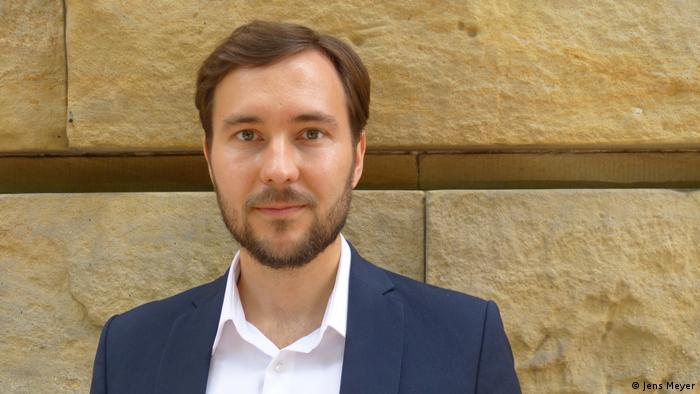Sanctions are popular means to frighten despots and enforce national interests. But the FinCEN files show that sanctions can be circumvented, often with the help of banks.
When Syrian President Bashar Al-Assad was seen to commit atrocities against his own people, President Barack Obama imposed sanctions on representatives of his regime in April 2011. The measures targeted wealthy Syrians including Mahir al-Assad, the president's brother, aiming to ensure that those responsible for such atrocities would not be able to send their money around the globe.
The EU followed suit shortly afterwards and Syria sanctions were quickly extended. The regime's access to weapons, to gasoline, to the international financial market was to be blocked. Such targeted sanctions are considered the means of choice for exerting pressure on despots and their associates.
Read more: FinCEN files — tracing the flow of dirty money
Ruble to dollar, dollar to art
But do such sanctions work? There has always been some doubt about that. The FinCEN Files show once again: Sanctions can be circumvented — with the help of banks and a network of offshore companies.
For example, the Suspicious Activity Reports (SARs) that banks leaked to the US Treasury Department show that Russian President Vladimir Putin's close friend Arkady Rotenberg is said to have transferred money to Barclays Bank in London through a company called Advantage Alliance. It was money with which he later supposedly bought art on a grand scale. Among the works purchased was a painting by Belgian surrealist Rene Magritte worth $7.5 million US (€6.4 million).
The journalists involved in the FinCEN Files investigation, among them reporters from Buzzfeed News, German public broadcasters NDR and WDR and German daily Süddeutsche Zeitung, also revealed that banks might have helped clients with illegal transactions to and from Iran. From 2013 to 2017, British Standard Chartered Bank is said to have put aside suspicions of breaking US sanctions and waved through hundreds of millions of US dollars.
According to the FinCEN Files, the sanctions against Syria are also likely to have been circumvented. The Bank of New York Mellon is said to have transferred $224 million for a company based in Malta called "Petrokim." Among them were transactions that might have benefited persons blacklisted under the Syrian sanctions.
The ball is in the banks' court
Why are state authorities not stopping this? "There is simply not enough manpower for this in the responsible authorities. They can't pursue every case," says Sascha Lohmann of the German Institute for International and Security Affairs in Berlin. He is a political scientist with the think tank's Research Group America and has been working intensively on FinCEN.

It's the banks who take the risk, says Sascha Lohmann
All US banks have to report suspicious cases to FinCEN. The government has the power to then make them limit or deny services to certain foreign banks in order to cut off their access to the US dollar. The ball is thus in the court of the banks, which must expect penalties for violations. Lohmann speaks of a "risk-based approach" to prevent money laundering and sanction evasion. "The goal is for banks to realize: 'certain regions, certain business partners are so dangerous for us that we keep our hands off them entirely.'"
This has often worked in the past, which is why Lohmann says it is "initially surprising to see how many, for example, Russian business partners of politicians close to the Kremlin, who are blacklisted in Europe or the United States, can still move money back and forth."
Driven by fear and greed
The FinCEN Files came as no surprise to her, says Saskia Rietbroek. As director of the "Association of Certified Sanctions Specialists", she advises banks and other companies seeking help in complying with sanction rules. "Sanctions evasion is really pervasive and criminals go at lengths to stay under the radar", Rietbroek told DW. "That is why many banks get caught up in sanctions evasions problems. So this were not the first banks and will not be the last banks involved in some sanctions evasion scheme."
Bank employees in compliance departments would do their utmost to ensure no rules are broken, she says. "The compliance officers really want to do the right thing. At least that's what I see with our members." They did believe in their important role in protecting their country against national security threats such as terrorism, she adds. "But on the other hand, there are commercial interests. And that is always a struggle, that struggle between the business and compliance departments. You know, banks live between fear and greed."

It is Saskia Rietbroek's job to help banks adhere to rules and regulations
Peeling the onion
However, Rietbroek also points out that it is becoming increasingly difficult to comply with the sanction rules. "Up until a couple of years ago it was just North Korea and Cuba. You couldn't do business with them and almost nobody was doing business with them." However, these broad sanctions hit the population more than the ruling class. For several decades, the UN, the US and the EU in particular have therefore been relying on targeted sanctions, which are primarily directed at individuals.
"But now with, for instance, Russia, there are a lot of oligarchs, people with a lot of money, with a lot of business interests that have been placed on the list," Rietbroek explains. "And you can't just close all their accounts. You have to see what is legal and what is prohibited. And that takes time and expertise, which is not always there."
If a bank suspects that a customer is up to something illegal, it must investigate further. Rietbroek calls this Enhanced Due Diligence: "It's sometimes like peeling an onion: layer after layer of shell corporations. I've seen visual representations of links between offshore companies and people on transactions that were the size of a tablecloth." That is why connecting the dots takes a lot of time. "And sometimes they're told: 'if you don't find anything bad at first sight, go on.'"

'Hero of Socialist Labor' — Vladimir Putin awarded Arkady Rotenberg the gold star medal for building a bridge to the Crimean peninsula
Up to now, such violations have mostly been punished with fines. But, says Rietbroek: "If there was willful conduct to evade sanctions, in my opinion, there should be prison terms and people should be sent to jail. And that is sometimes lacking. And I don't think it should be the compliance people who should go to prison. Typically, it's the people at the top who pressure the compliance people."
No real alternative
You can't prevent all illegal money transfers anyway, says Francesco Giumelli of the University of Groningen in the Netherlands. The political scientist has done research on the success of sanctions. "The problems with the implementation of sanctions are not new," he told DW. "We knew this before and this just brings more evidence to the fact that there are problems with the system as it is."
However, one should also consider the symbolic effect of sanctions, Giumelli argues. "Sanctions sustain norms. In order to avoid sanctions, actors don't even engage in certain activities. That is the real value of sanctions rather than simply preventing money from going around." Thus, sanctions will probably continue to be used in the future — both to enforce national interests and to deter autocratic behavior and human rights violations, such as those in Syria.
"It is also about more than just trying to influence behavior," says Lohmann. "Sanctions are a form of strategic communication with relevant third parties and they are also about maintaining one's own self-image." For example, the European states did not want to stand idly by and watch what is happening in Belarus. Even if sanctions are repeatedly undermined: "It will probably continue to be the means of choice," says Lohmann, "because there are not many other options."
tinyurlis.gdclck.ruulvis.netshrtco.de
مقالات مشابه
- چگونه مواد شیمیایی درست کنیم
- میکی Deegan موسیقی بیش از صد شعر با ریتم و قلب ضرباندار خطوط گرفتن جوهر زندگی
- اریک Ribbens گرمی روایت کودکان کتاب مزرعه حیوانات و عشق
- روش های بهینه سازی کارایی دستگاه تزریق پلاستیک
- لهستان بازگشایی مرز با اتحادیه اروپا و همسایگان
- شرکت صادرات و واردات کالاهای مختلف از جمله کاشی و سرامیک و ارائه دهنده خدمات ترانزیت و بارگیری دریایی و ریلی و ترخیص کالا برای کشورهای مختلف از جمله روسیه و کشورهای حوزه cis و سایر نقاط جهان - بازرگانی علی قانعی
- شرکت صادرات و واردات کالاهای مختلف از جمله کاشی و سرامیک و ارائه دهنده خدمات ترانزیت و بارگیری دریایی و ریلی و ترخیص کالا برای کشورهای مختلف از جمله روسیه و کشورهای حوزه cis و سایر نقاط جهان - بازرگانی علی قانعی
- تامسون رویترز به همکاری با ای در اجرای آن Orbitax بین المللی مالیات پلت فرم (ITP)
- GE Healthcare, نارنجی, بهداشت و درمان و TheraPanacea همکاری با کمک Publique-Hôpitaux پاریس و Société d'Imagerie Thoracique برای ایجاد COVID-19 پایگاه داده و توسعه هوش مصنوعی و ابزارهای مبتنی بر
- TDK SmartBug™ هوشمند چند سنسور IoT ماژول در حال حاضر در دسترس در سراسر جهان